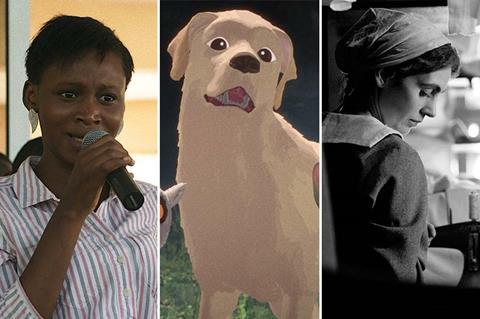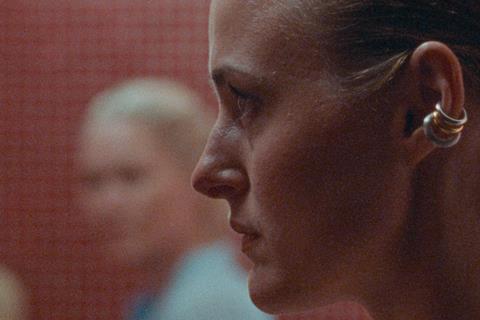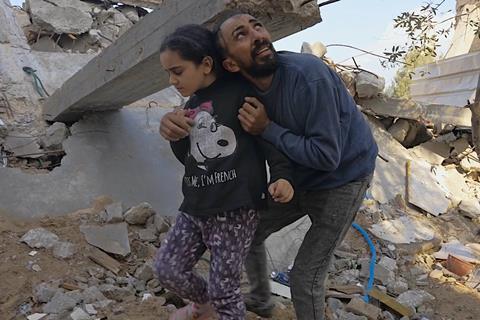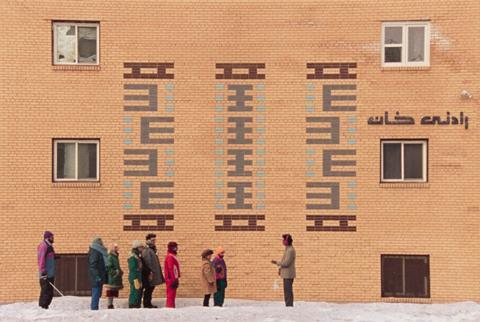
Once again, European nations dominate the US Academy’s shortlist for international feature film – nabbing 10 of the 15 slots, up from nine a year ago. The Americas region has landed two shortlist entries, with films from Brazil and Canada, and there is one entry apiece from Asia (Thailand), Africa (Senegal) and the Middle East (Palestine).
All five of the eligible titles that earned Golden Globe nominations for non-English language film have made the Oscar shortlist: Emilia Pérez (France), The Girl With The Needle (Denmark), I’m Still Here (Brazil), The Seed Of The Sacred Fig (Germany) and Vermiglio (Italy). The Globes also nominated Payal Kapadia’s All We Imagine As Light, but India submitted Lost Ladies instead to the Oscars, and Kiran Rao’s film did not make the shortlist.
Films launching on the Croisette have flourished: in addition to Emilia Pérez, The Girl With The Needle and The Seed Of The Sacred Fig, Cannes premieres making the shortlist are Armand, Flow, Santosh and Universal Language. Venice provided a launch for two of the films – I’m Still Here and Vermiglio – while Berlin (Dahomey), Sundance (Kneecap) and Karlovy Vary (Waves) have one title apiece on the list.
France, which last achieved a nomination for this Oscar category in 2020 with Les Miserables, and last won in 1993 with Indochine, must be considered a front runner with Jacques Audiard’s Emilia Pérez – which is also one of the foreign-language films almost certain to achieve major awards nominations across multiple categories. Walter Salles’ I’m Still Here – depicting events impacting his own family friends in the 1970s – might also spread its wings to categories such as leading actress.
Despite the seemingly Eurocentric shortlist, Iran – whose own Oscar entry In The Arms Of The Tree did not make the grade this year – features in two films submitted by other nations. Germany’s selection, The Seed Of The Sacred Fig, is directed by Iran’s Mohammad Rasoulof and is wholly set and filmed in the country. And Canada’s selection, Universal Language, is in Farsi, and set in an alternative Winnipeg populated with Iranian characters.
Local box office hits have made a showing, among them Thailand’s How To Make Millions Before Grandma Dies, Latvia’s Flow, Ireland’s Kneecap, Brazil’s I’m Still Here, Czech Republic’s Waves, Iceland’s Touch and Italy’s Vermiglio. Emilia Pérez has achieved a healthy 1.1million admissions in France.
Eleven of the 15 films are eligible to compete at the Bafta Film Awards, where the requirement is an appropriately timely release in UK cinemas. Round one voting for the Bafta Film Awards is currently open, and closes on December 30. Round two voting for the US Academy Awards, when the international feature shortlist of 15 will be reduced to five nominees, runs January 8-12.

Armand (Norway)
Dir. Halfdan Ullmann Tøndel
Winner of the Golden Camera for best first feature at the Cannes Film Festival this year, the Un Certain Regard premiere was dubbed “an intense, troubling and confidently executed debut feature” by Screen. Renate Reinsve stars as a mother who is summoned to her six-year-old son Armand’s primary school after a class mate accuses him of sexual abuse. Norway was last nominated for the international feature Oscar in 2022 for Joachim Trier’s The Worst Person In The World, which also starred Reinsve – who received a best actress Bafta nomination for that performance. Armand is not competing for the Baftas this year as it will not be released in UK cinemas in time to qualify.
Dahomey (Senegal)
Dir. Mati Diop
This is the second time on the international feature shortlist for French-Senegalese director Diop, whose Cannes Grand Prix winner Atlantics made it that far – but surprisingly no further – for the 2020 awards. Winner of the Golden Bear at the Berlinale, Diop’s non-fiction foray Dahomey – which she has described as a “fantasy documentary” – tells the story of 26 royal artefacts stolen by French colonial troops in 1892, which were sent from Paris back to what is now the Republic of Benin in 2021. Dahomey was picked up by Mubi for North America, the UK and other territories, and began its cinema release in October. At the European Film Awards, it was nominated for European documentary (losing to No Other Land) and European film (losing to Emilia Pérez).
Eligible for Bafta Film Awards (Mubi)
Emilia Pérez (France)
Dir. Jacques Audiard
France made the international feature shortlist last year with Tran Anh Hung’s The Taste Of Things, but progressed no further – an outcome that would surely have been avoided had the country instead submitted Justine Triet’s Anatomy Of A Fall. This time, France looks set to go the distance with Audiard’s Spanish-language musical about a Mexican cartel boss who fakes their own death and transitions to a woman. Emilia Pérez premiered in Cannes where it won the Jury Prize, while Karla Sofia Gascon, Zoe Saldana, Selena Gomez and Adriana Paz shared the best actress award – and the film has gone on to achieve multiple accolades including five wins at the European Film Awards (including the top prize for European film) and 10 Critics Choice Awards nominations. Audiard was Oscar-nominated in this category for A Prophet in 2010, and won the Bafta for film not in the English language that year.
Eligible for Bafta Film Awards (Netflix)
Flow (Latvia)
Dir. Gints Zilbalodis
Latvia makes the Oscar shortlist for the first time, with its 16th attempt. This Cannes Un Certain Regard-launched wordless animation – about a cat and several other animals trying to keep their heads above water during a biblical deluge – won four awards at Annecy and has been making friends ever since on the festival circuit. Zilbalodis’s second feature following his 2019 Away, Flow is shaping up as a serious contender for animation awards this season, with wins so far including the European Film Awards and New York Critics Circle, and nominations including Golden Globes and Critics Choice Awards. Jonas Poher Rasmussen’s Danish entry Flee in 2022 was the last animation to secure an international feature Oscar nomination. Janus Films and Sideshow released Flow in North America in late November 22, grossing $1.3m; worldwide, the film has reached $5.2m, helped by a powerful performance in France via UFO Distribution.
Eligible for Bafta Film Awards (Curzon)

From Ground Zero (Palestine)
Dir. Masharawi Fund
Many felt Palestine had made a mis-step by not selecting documentary No Other Land, and that film – from a Palestinian-Israeli quartet of filmmakers – is indeed shaping up to be a major contender this awards season. Still, this inaugural project from Palestinian filmmaker Rashid Masharawi’s Gaza film fund – which is a compilation of 22 short films capturing the situation in Gaza amid the ongoing war with Israel – makes the international feature shortlist. It’s Palestine’s first time on the shortlist since Hany Abu-Assad’s Omar was nominated in 2014, and follows one other nomination for the country in 2006, with Abu-Assad’s Paradise Now. From Ground Zero, which encompasses documentary, drama, animation and experimental, premiered at the Amman International Film Festival in July, and received its North American premiere in Toronto. The film will be released in select US theatres on January 3 via Watermelon Pictures.
The Girl With The Needle (Denmark)
Dir. Magnus von Horn
Denmark has a strong track record in this Oscar category, having won the prize four times (most recently in 2021 with Another Round), and achieved 14 nominations in total (most recently in 2022 with Flee). The Girl With The Needle sees Swedish filmmaker von Horn (Sweat) offer a black-and-white drama, set in Copenhagen in the wake of the First World War, about the friendship between an impoverished, unhappily pregnant factory worker (Vic Carmen Sonne) and the woman (Trine Dyrholm) who helps her solve her problem. This dark drama, which is inspired by a true story, was acquired by Mubi for major territories including North America, releasing there with a modest platform on December 6.
Eligible for Bafta Film Awards (Mubi)
How To Make Millions Before Grandma Dies (Thailand)
Dir. Pat Boonnitipat
Thailand makes the Oscar shortlist for the first time with its 31st submission – and does so with a family drama that has proved a major hit in Singapore and Indonesia, as well as in Thailand, with total worldwide box office reported at $78m. Boonnitipat’s feature directing debut tells the story of a college dropout who moves in with his terminally ill grandmother to care for her, motivated by her fortune, but finds winning her favour is no easy feat. Popular Thai singer Putthipong Assaratanakul (aka Billkin) stars opposite Usha Seamkhum. Netflix acquired the film for key Asian markets following the box office success, launching on the platform in mid-September. Vertigo releases in the UK on December 26.
Eligible for Bafta Film Awards (Vertigo)
I’m Still Here (Brazil)
Dir. Walter Salles
Brazil was last nominated in this Oscar category in 1999 with Salles’ Central Station (the country’s fourth nomination to date, with no wins so far), and it made the shortlist subsequently in 2008 with Cao Hamburger’s The Year My Parents Went On Vacation. Salles returns with a true story about the Paiva family (friends of the filmmaker in his youth) during Brazil’s 1970s military regime. Fernanda Torres stars as wife and mother Eunice Paiva who must look after her family when her former-congressman husband Rubens Paiva (Selton Mello) is disappeared, with Torres’ own mother Fernando Montenegro cameoing as the older version of Eunice. I’m Still Here premiered in Venice, winning the screenplay prize, and going on to pick up nominations at the Critics Choice Awards (foreign language film) and Golden Globes (for actress in a drama, and non-English language picture). Sony Pictures Classics released in North America in November, while Sony’s release in Brazil has grossed $10.1m.
Eligible for Bafta Film Awards (Mubi)
Kneecap (Ireland)
Dir. Rich Peppiatt
Ireland was nominated for this Oscar for the first time in 2023 with The Quiet Girl, and now looks a strong contender to repeat that feat, and perhaps secure the country’s first win. This debut feature from Rich Peppiatt has been popular on the festival circuit since premiering in Sundance in January and winning the festival’s NEXT audience award, and has gone on to plenty of awards success such as seven wins at the Bifas, including top prize best British independent film. Set in west Belfast, the film follows the fictionalised rise of the real-life Irish-language hip-hop trio Kneecap — who star as themselves alongside Michael Fassbender, Fionnuala Flaherty, Simone Kirby and Josie Walker. Sony Pictures Classics acquired US and select international territories, while Curzon and Wildcard distributed for the UK and Ireland, grossing more than $2.6m (£2.1m).
Eligible for Bafta Film Awards (Curzon)
Santosh (UK)
Dir. Sandhya Suri
The UK had never won this Oscar category until last year, when it submitted Jonathan Glazer’s The Zone Of Interest, set in German-occupied Poland, and it was previously nominated only twice, both with Welsh-language features. The country now bids for its fourth nomination with a drama about a newly widowed woman who inherits her husband’s job as a police officer in rural northern India and is taken under the wing of a feminist police inspector. The Hindi-language fiction feature debut of British-Indian filmmaker Suri – who was Bafta-nominated for her 2018 short The Field – Santosh debuted in Cannes’ Un Certain Regard before embarking on a healthy festival run. Four Bifa nominations converted to two wins: for screenplay and breakthrough producer.
Eligible for Bafta Film Awards (Vertigo)
The Seed Of The Sacred Fig (Germany)
Dir. Mohammad Rasoulof
Germany is coming off a strong run in this Oscar category: the country was nominated last year with The Teacher’s Lounge, won the year before with All Quiet On The Western Front, and has two more nominations in the past decade (Toni Erdmann and Never Look Away). This is the country’s seventh time on the shortlist in the past decade, pivoting away from the German language by selecting Iranian exile Rasoulof’s drama about a Tehran patriarch whose promotion to investigating judge sparks tension with his wife and politically aware daughters. The Seed Of The Sacred Fig premiered in Cannes where Rasoulof, who fled his home country shortly before the premiere when he was sentenced to eight years in prison and flogging for being critical of the regime, was awarded a special prize by the jury. Neon released in North America on November 27. Worldwide box office exceeds $4m, driven by strong success in France via Pyramide Distribution.
Eligible for Bafta Film Awards (Lionsgate)
Touch (Iceland)
Dir. Baltasar Kormakur
Icelandic stalwart Kormakur represents his country at the Oscars for a fifth time. Previously, his The Deep made the shortlist in 2013, but the other three films missed out, and he has never been nominated. Iceland has been nominated only once – in 1992, with Thor Fridriksson’s Children Of Nature. Set in two timelines 50 years apart, Touch stars Egill Olafsson and Palmi Kormakur as Kristofer, respectively as a widower travelling to London to help unravel the mystery of his first love, and as a college student who drops out of his London university to work at a Japanese restaurant. The Universal release is one of two films by Mike Goodridge’s Good Chaos on this Oscar shortlist – joining Santosh.
Eligible for Bafta Film Awards (Universal)

Universal Language (Canada)
Dir. Matthew Rankin
Canada has been nominated for the Oscar honouring foreign-language films seven times, winning in 2004 with Denys Arcand’s The Barbarian Invasions, and it last made the shortlist in 2017 with Xavier Dolan’s It’s Only The End Of The World. Although set in Winnipeg, this absurdist caper transposes Iran to the Manitoba city, as it interweaves several episodes: children discover money frozen in ice; a walking tour guide leads his guests to underwhelming attractions; and a man quits his job with the provincial government of Quebec and returns home. Universal Language premiered in Cannes, then travelling to festivals such as Toronto, New York and Fantastic Fest. Maison 4:3 is the Canadian distributor while Oscilloscope releases in the US.
Vermiglio (Italy)
Dir. Maura Delpero
Italy has won this Oscar 14 times – more than any other country – including three times in the non-competitive period prior to the 1957 awards. However, Italy’s pace has slowed in recent years, last winning in 2014 with The Great Beauty, and receiving nominations since then with The Hand Of God in 2022 and Io Capitano in 2024. This second scripted feature from Delpero, following 2019’s Maternal, won the Grand Jury Prize in competition at Venice, and grossed $2.5m in Italy for distributor Lucky Red. Set in 1944 in the titular Italian alpine village, the drama stars Giuseppe De Domenico as a deserter soldier disrupting the life of the village teacher and his family when the eldest daughter falls in love with him. Nominations so far for Vermiglio include at the Golden Globes – for non-English language picture.
Eligible for Bafta Film Awards (Modern Films)
Waves (Czech Republic)
Dir. Jiří Mádl
Since its creation, the Czech Republic has won this Oscar category once (in 1997, with Kolya) and been nominated on two other occasions (Divided We Fall in 2001 and Zelary in 2004). Prior to its division, Czechoslovakia had six nominations, converting to two wins (both directed by Milos Forman – Loves Of A Blonde in 1967 and The Firemen’s Ball in 1969). The Czech Republic now makes the shortlist for the third time in six years (following The Painted Bird and Charlatan at the 2020 and 2021 awards). Historical thriller Waves won the audience award at Karlovy Vary, where it had its world premiere, and is based on a true story set during the Prague Spring – about a group of journalists who are determined to keep independent news running during the Soviet invasion. The film – the third feature for Mádl – was a hit both at home and in neighbouring Slovakia, grossing $7m across the two markets.






![The Brightest SunScreen[Courtesy HKIFF]](https://d1nslcd7m2225b.cloudfront.net/Pictures/274x183/3/5/0/1448350_thebrightestsunscreencourtesyhkiff_312678.jpg)


















No comments yet